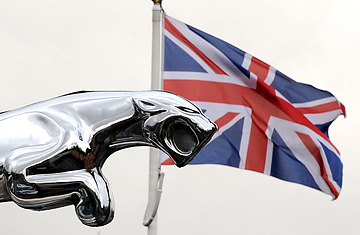
The joint leader of Britain's biggest union, Unite, said Wednesday that India's Tata Motors had clinched a deal to buy British luxury car makers Jaguar and Land Rover from US group Ford.
In 1989, Jaguar Cars, one of Britain's most iconic — and troubled — automotive brands was on the block. The Ford Motor Co. and General Motors Corp., Detroit's two biggest heavyweight players in the industry, both wanted what resembled a dented, but potentially valuable, possession. Ford won the ensuing bidding war, paying $2.5 billion for the coveted car brand. Accelerate ahead 11 years to 2000, and Ford again had its checkbook out, paying $2.7 billion for Land Rover, another luxury British carmaker that had run into some rough road. It also invested many billions more trying to turn both companies around, mainly by upgrading aging plants and developing new product lines. It was a big bet, and it didn't pay off.
On Wednesday, Ford announced it was selling both brands to Tata Motors of India for $2.3 billion in a deal that's been in the works for months — and is about half the price Ford paid for them in the first place. Analysts say Tata's scored a bargain-basement price for Land Rover alone, since it is already a profitable brand (Ford doesn't break out financial figures for individual units). Jaguar, however, continues to lose money and its sales remain in free fall. Despite hitting a high-water mark of 130,000 sales in 2004 — which Ford felt could eventually rise to 300,000 — Jag's sales slid to 60,500 by 2007 and they're continuing to fall. But it should have a viable future as a niche brand. "Besides, it's too small now to lose too much money," says Jay Nagley, an analyst at London consultants Spyder Automotive.
Both companies have been hobbled by poor quality and productivity for years, and Ford clearly spent huge sums to attempt to correct those problems. "Most of the hard work's over, the real painful things have been done, at Ford's expense," Nagley believes. All Tata needs to do is continue to spend the money needed to make Ford's investment pay off. Given that Tata is India's biggest conglomerate, cash shouldn't be a problem.
Critics claim that Ford's biggest mistake was introducing a low-cost X series that buyers shunned for essentially being too Ford-like. "They tried to make Jaguar a full-line BMW on the cheap," Nagley says, but the public wasn't interested in "pale imitations with appalling style." At Land Rover, however, it got the product mix right and sales increased — they jumped 18% last year to 226,400. So why is Ford also unloading Land Rover? "I think they're desperate for cash. It's not a good thing when a company sells off a profitable unit," says John Wormald, managing partner at consultant Autopolis. Ford has lost $15.3 billion over the last two years.
Until clinching this purchase, Tata's main claim to fame was its recent introduction of the $2,500 Nano, a basic box on wheels sold only in India. Will luxury car buyers be put off by Jags (the price of Jaguar's latest sports car is more than $64,000) and Land Rovers made by an Indian company that also sells the world's cheapest car? "Not if it's sensitively handled," Wormald says. That means for the foreseeable future, both brands will likely continue to be produced in the U.K., to keep their British-made pedigree intact. Furthermore, the companies said there would not be any "significant changes" to Jaguar or Land Rover employees' terms of employment on completion of the sale.
Despite Tata's sweet deal (it's considered small by the standards of the global automotive industry), it's not a great time to be buying two carmakers heavily reliant on the American market. As an apparent recession kicks in, sales of all luxury cars in the U.S. are starting to tumble. And the weak dollar doesn't help matters either. So look for Tata to try to open up emerging markets for Jaguar and Land Rover across Asia and Russia. "There's certainly room to do that," Wormald says. "But it will take an awful lot of time and money." Still, as gambles go, Tata's seems more likely to reap the payoff that eluded Ford.
